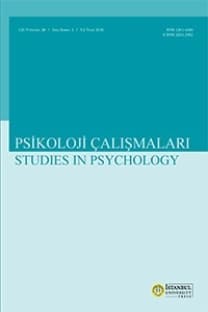Sahte Hatıralarda Zorunlu Seçim Yöntemi ile Hatırlıyorum/ Biliyorum ve Modalite Etkileri
Sahte hatıralar, DRM listeleri, sinyal denetleme teorisi, hatırlıyorum/biliyorum
Remember/Know and Modality Effects in a Forced-Choice Test of False Memory
False memory, DRM paradigm, signal detection theory, remember/ know,
___
- Boldini, A., Beato, M. S., & Cadavid, S. (2013). Modality-match effect in false recognition: An eventrelated potential study. NeuroReport, 24(3), 108–113.
- Brainerd, C. J., & Reyna, V. F. (2002). Fuzzy Trace Theory and false memory. Current Directions in Psychological Science, 11(5), 164–169.
- Brainerd, C. J., Reyna, V. F., & Mojardin, A. H. (1999). Conjoint recognition. Psychological Review, 106(1), 160–179.
- Calvillo, D. P., & Parong, J. A. (2016). The misinformation effect is unrelated to the DRM effect with and without a DRM warning. Memory, 24(3), 324–333.
- Cleary, A., & Greene, R. (2002). Paradoxical effects of presentation modality on false memory. Memory, 10, 55–61.
- Gallo, D., McDermott, K., Percer, J., & Roediger, H. (2001). Modality effects in false recall and false recognition. Journal of Experimental Psychology, 27, 339–353.
- Gallo, D. (2006). Associative illusions of memory. NY: Psychology Press.
- Gardiner, J. M., & Parkin, A. J. (1990). Attention and recollective experience in recognition memory. Memory & Cognition, 18(6), 579–583.
- Green, D. M. & Swets, J. A. (1966). Signal detection theory and psychophysics. New York: Wiley. Reprinted 1974 by Krieger, Huntington, NY.
- Hunt, R. R., Smith, R. E., & Dunlap, K. R. (2011). How does distinctive processing reduce false recall? Journal of Memory and Language, 65, 378–389.
- Israel, L., & Schacter, D. L. (1997). Pictorial encoding reduces false recognition of semantic associates. Psychonomic Bulletin & Review, 4, 577–581.
- Kellogg, R. T. (2001). Presentation modality and mode of recall in verbal false memory. Journal of Experimental Psychology: Learning, Memory, & Cognition, 27, 913–919. Marche, T. A., & Brainerd, C. J. (2012). The role of phantom recollection in false recall. Memory and Cognition, 40, 902–917.
- Miller, M., & Wolford, G. (1999). Theoretical commentary: The role of criterion shift in false memory. Psychological Review, 106, 398–405.
- Ost, J., Blank, H., Davies, J., Jones, G., Lambert, K., & Salmon, K. (2013). False memory ≠ false memory: DRM errors are unrelated to the misinformation effect. PLoS ONE, 8(4).
- Rajaram, S. (1993). Remembering and knowing: Two means of access to the personal past. Memory & Cognition. 21(1), 89–102.
- Reyna, V. F., & Lloyd, F. (1997). Theories of false memory in children and adults. Learning and Indiviual Differences, 9, 95–123.
- Roediger, H., & McDermott, K. (1995). Creating false memories: remembering words not presented in lists. Journal of Experimental Psychology: Learning, Memory, and Cognition, 21, 803–814.
- Schacter, D. L., Norman, K. A., & Koutstaal, W. (1998). The cognitive neuroscience of constructive memory. Annual Review of Psychology, 49, 289–318.
- Singer, M., & Remillard, G. (2008). Veridical and false memory for text: A multiprocess analysis. Journal of Memory and Language, 59, 18–35.
- Smith, R. E., & Hunt, R. (1998). Presentation modality affects false memory. Psychonomic Bulletin & Review, 5, 710–715.
- Smith, R. E., Reed Hunt, R., & Dunlap, K. R. (2015). Why do pictures, but not visual words, reduce older adults’ false memories? Psychology and Aging, 30(3), 647–655.
- Smith, R. E., Hunt, R. R., & Gallagher, M. P. (2008). The effect of study modality on false recognition. Memory & Cognition, 36, 1439–1449.
- Smith, R., & Engle, R. (2011). Study modality and false recall. Experimental Psychology, 58(2), 117–24.
- Şahin, G. (2011). Sahte hatıralarda işitsel modalite ile görsel modalite arasında ortaya çıkan farkın sinyal denetleme teorisi ve güven aralıkları ile incelenmesi. (Yayınlanmamış yüksek lisans tezi). Bursa Uludağ Üniversitesi Sosyal Bilimler Enstitüsü, Bursa.
- Tekcan, A., & Göz, I. (2005). Türkçe kelime normları: 600 Türkçe kelimenin imgelem, somutluk, sıklık değerleri ve çağrışım setleri. İstanbul: Boğaziçi Üniversitesi Yayınları.
- Weinstein, Y., McDermott, K.B., & Chan, J.C.K. (2010). True and false memories in the DRM paradigm on a forced choice test. Memory, 18, 375–384.
- Westerberg, C., & Marsolek, C. (2003). Sensitivity reductions in false recognition: A measure of false memories with stronger theoretical implications. Journal of Experimental Psychology: Learning, Memory, and Cognition, 29, 747–759.
- Yonelinas, A. (2002). The nature of recollection and familiarity: A review of 30 years of research. Journal of Memory and Language, 46, 441–517.
- ISSN: 1304-4680
- Başlangıç: 1956
- Yayıncı: İstanbul Üniversitesi
4-6 Yaş Çocuklarında Kaynak Dağıtımında Eşitsizlikten Kaçınmayı Etkileyen Faktörlerin İncelenmesi
Genç ve Orta Yaşlı Yetişkinlerin En Eski ve Daha Sonraki Otobiyografik Anılarının Karşılaştırılması
Berivan ECE, Burcu DEMİRAY, Sezin ÖNER, Sami GÜLGÖZ
Tek Yumurta İkizi Ergenlerde İkiz Bağı ve Ayrışma-Bütünleşme Süreci
Sosyal Psikolojinin Altın Çağını Yeniden Düşünmek
Onurcan YILMAZ, Hasan G. BAHÇEKAPILI
Sahte Hatıralarda Zorunlu Seçim Yöntemi ile Hatırlıyorum/ Biliyorum ve Modalite Etkileri
Gökhan ŞAHİN, Hasan Gürkan TEKMAN
Romantik İlişki Becerileri Psikoeğitim Programının Etkinliğinin Sınanması: Bir Pilot Çalışma
Ahmet TOGAY, İrem ŞAHİN, Meral ATICI
Büyük Veri ve Derlem Anlambilim Açısından Aşk Kavramı: Anlam, Gönderim ve Metafor
